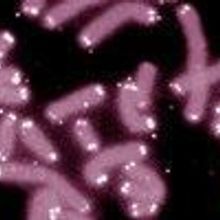Login
Subscribetelomeres, genetics & genomics, cell & molecular biology

Week in Review: April 7–11
Tracy Vence | Apr 11, 2014 | 3 min read
Stress and telomere length in children; osmotic channel protein identified; amoeba nibbles, then kills cells; amphetamine and mental disorder risk; news from AACR

Telomeres Affect Gene Expression
Ed Yong | May 5, 2013 | 3 min read
As telomeres shorten with age, genes as far as 1,000 kilobases away could be affected, including one responsible for an inherited muscle disease.
Six Threats to Chromosomes
Ed Yong | May 3, 2012 | 3 min read
Researchers identify two new DNA repair systems, in addition to four that were already known, that can attack unprotected telomeres.
